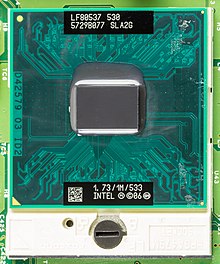 Celeron M 530 - SLA2G - 1.73GHz, 1 MB L2 Cache, 533 MT/s FSB | |
| General information | |
|---|---|
| Launched | 2006 |
| Discontinued | 2009 |
| Marketed by | Intel |
| Designed by | Intel |
| Common manufacturer |
|
| CPUID code | 06Fx (Merom-L: 1066x) |
| Product code | 80537 |
| Performance | |
| Max. CPU clock rate | 1.6 GHz to 2.6 GHz |
| FSB speeds | 533 MHz to 800 MHz |
| Cache | |
| L1 cache | 32 KB instruction, 32 KB data per core |
| L2 cache | Merom: 4 MB Merom-2M: 2 MB Merom-L: 1 MB |
| Architecture and classification | |
| Application | Mobile |
| Technology node | 65 nm |
| Microarchitecture | Core |
| Instruction set | x86_64 (64-bit) |
| Physical specifications | |
| Cores |
|
| Sockets | |
| Products, models, variants | |
| Brand names |
|
| History | |
| Predecessor | Yonah |
| Successor | Penryn |
| Support status | |
| Unsupported | |
Merom is the code name for various mobile Intel processors that are sold as Core 2 Duo, Core 2 Solo, Pentium Dual-Core and Celeron. It was the first mobile processor to be based on the Core microarchitecture, replacing the Enhanced Pentium M-based Yonah processor. Merom has the product code 80537, which is shared with Merom-2M and Merom-L that are very similar but have a smaller L2 cache. Merom-L has only one processor core and a different CPUID model. The desktop version of Merom is Conroe and the dual-socket server version is Woodcrest. Merom was manufactured in a 65 nanometer process, and was succeeded by Penryn, a 45 nm version of the Merom architecture. Together, Penryn and Merom represented the first 'tick-tock' in Intel's Tick-Tock manufacturing paradigm, in which Penryn was the 'tick' (new process) to Merom's 'tock' (new architecture).